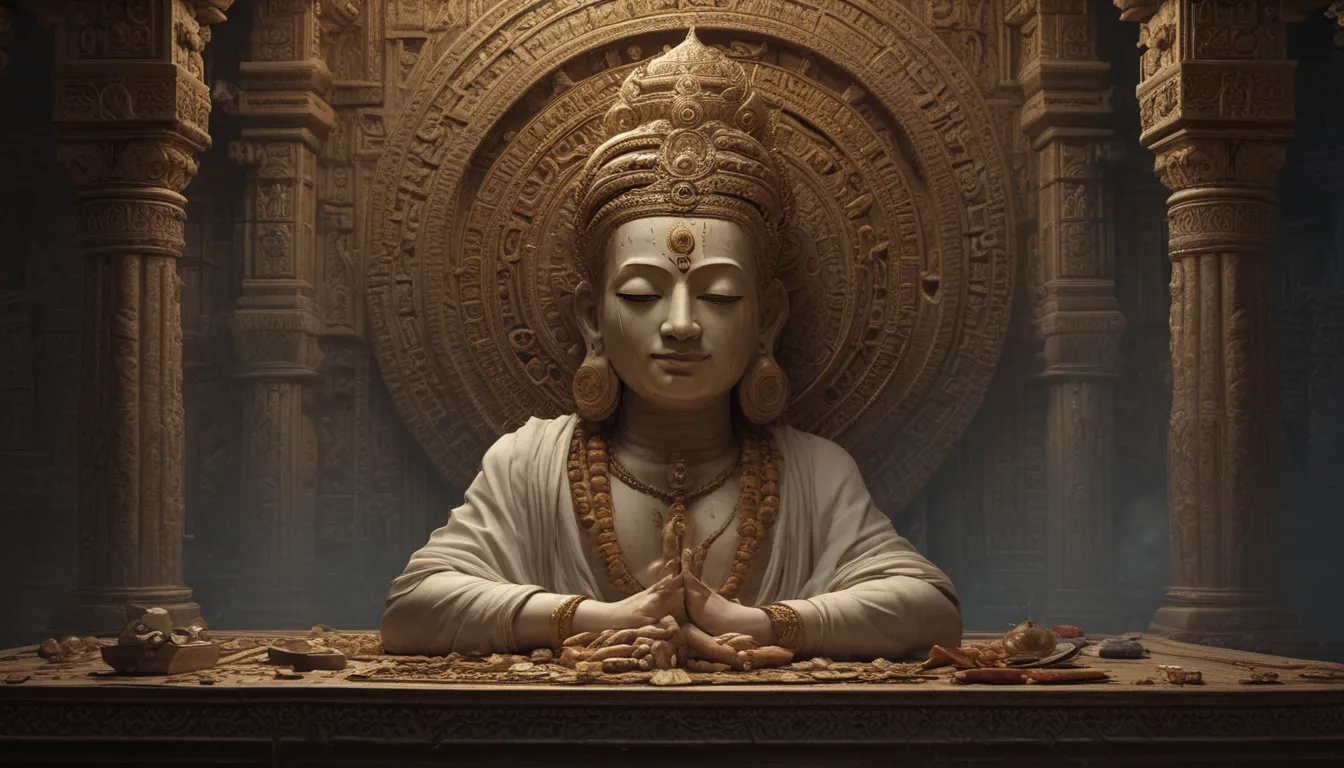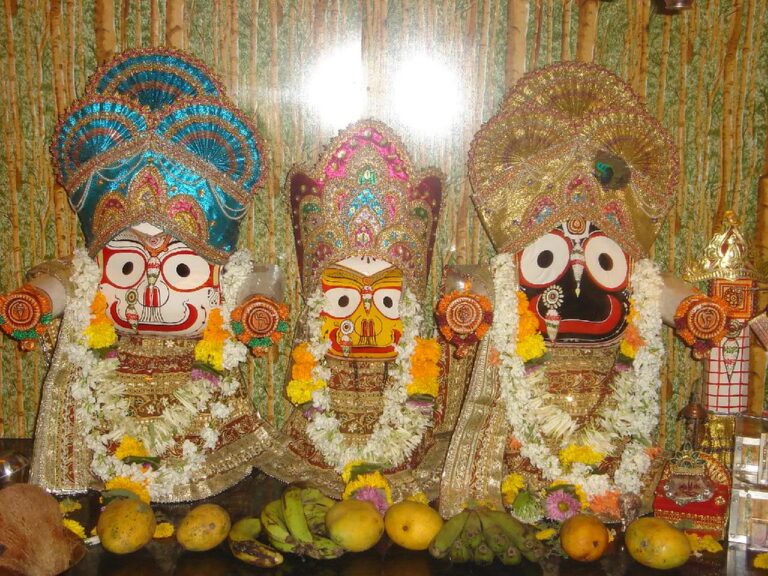The images in our articles may not match the content exactly. They are used to grab your attention, not to show the exact details in the text. The images complement the text but do not replace it.
Jainism, one of the oldest religions in the world, holds a profound significance in the realm of spirituality. Originating in ancient India, Jainism has stood the test of time, attracting followers from diverse backgrounds who seek spiritual enlightenment and liberation from the cycle of birth and death. With its core principles of non-violence, truth, and self-discipline, Jainism offers a unique perspective on life and spirituality that continues to inspire individuals across the globe. In this article, we will embark on a journey to explore 19 fascinating facts about Jainism that shed light on its rich cultural heritage, intricate beliefs, and profound practices. From the significance of non-violence and vegetarianism to the concept of karma and the path to ultimate liberation, Jainism encapsulates a world of wisdom waiting to be uncovered. So, let’s delve deep into the depths of this ancient religion and unravel its mysteries together.
Unlocking the Essence of Jainism
Jainism, with its roots dating back to the 6th century BCE, stands as one of the oldest religions in the world, predating both Buddhism and Hinduism. Founded by Lord Mahavira, a revered spiritual teacher, Jainism embodies a rich tapestry of beliefs and practices that shape the lives of its followers. At the core of Jain philosophy lies the principle of non-violence (ahimsa), a guiding light that illuminates the path of compassion and ethical living. Jains believe in reincarnation and karma, acknowledging the cyclical nature of life and the interplay of actions and consequences. The adherence to a strict vegetarian diet underscores the Jain commitment to ahimsa, reflecting a deep reverence for all living beings. Through intense ascetic practices, meditation, and self-discipline, Jains seek to purify their souls and attain spiritual enlightenment. The concept of Anekantavada, emphasizing non-absolutism and the multifaceted nature of reality, adds a layer of complexity to Jain teachings, inviting individuals to embrace diverse perspectives and foster empathy and understanding.
Embracing Jain Practices and Beliefs
Jainism’s unique practices and beliefs offer a glimpse into a world steeped in tradition and spirituality. The ornate Jain temples adorned with intricately carved marble stand as testaments to the exquisite craftsmanship and devotion of Jain artisans. The practice of intense meditation and self-reflection enables individuals to embark on a journey of self-realization and inner peace, transcending worldly desires. Jain monks and nuns, in their pursuit of simplicity and detachment, eschew modern conveniences like electricity and electronic devices, embodying a life of austerity and mindfulness. The observance of five main vows, Anuvratas, serves as a moral compass for Jains, guiding them in leading a righteous and ethical life. Rituals such as Paryushan, an annual festival of self-discipline and fasting, symbolize the spiritual discipline and commitment of Jain communities. Through the recognition of divine beings known as Tirthankaras and the reverence for sacred Jain scriptures written in Ardhamagadhi, Jains uphold a rich heritage and a profound spiritual heritage that continues to inspire seekers of truth and wisdom.
Nurturing Compassion and Environmental Consciousness
Jainism’s emphasis on non-violence extends beyond actions to encompass thoughts and speech, urging individuals to cultivate a mindset of forgiveness and empathy. The promotion of environmental awareness and conservation underscores the Jain commitment to sustainable living and the protection of nature. Through active engagement in community service and charity, Jains exemplify the values of compassion, generosity, and altruism, making a positive impact on society at large. While Jainism primarily thrives in India, it has traversed geographical boundaries, establishing significant communities in countries such as the United States, Canada, and the United Kingdom. By advocating for peaceful coexistence and mutual respect among diverse religious traditions, Jainism contributes to a culture of harmony and understanding, enriching the fabric of human spirituality.
Unveiling the Mysteries of Jainism
As we navigate the intricate landscape of Jainism, we uncover a world brimming with wisdom, compassion, and reverence for life. The 19 facts about Jainism serve as signposts guiding us on a transformative journey of introspection and enlightenment. Through the lens of Jain principles and practices, we gain a deeper understanding of the interconnectedness of all beings and the significance of ethical living. Whether you are drawn to the path of non-violence or intrigued by the complexities of karma and rebirth, exploring Jainism unveils a treasure trove of spiritual insights and timeless teachings. By immersing ourselves in the profound philosophies of Jainism, we embrace a holistic approach to life that nurtures the soul, inspires the mind, and uplifts the spirit.
FAQs: Exploring Jainism
- What are the key beliefs of Jainism?
Jainism is founded on the principles of non-violence (ahimsa), truth (satya), non-stealing (asteya), celibacy (brahmacharya), and non-possessiveness (aparigraha). Jains believe in the cyclical nature of life, karma and its impact on rebirth, and the existence of multiple realms and beings. - Are Jains vegetarian?
Yes, Jains are predominantly vegetarian, as they believe in the principle of ahimsa or non-violence towards all living beings. They abstain from consuming meat, fish, and eggs and may also avoid vegetables like onions and garlic due to the belief that they may contain microorganisms. - How do Jains practice non-violence?
Jains practice non-violence by being mindful of their actions and words. They avoid causing harm to any living being, even in thought. This includes practicing forgiveness, compassion, and refraining from violence in any form. - What is the significance of fasting in Jainism?
Fasting is an important spiritual practice in Jainism. By abstaining from food and drink, Jains seek to purify their bodies and minds. Fasting is believed to help control desires and focus the mind inward, aiding in spiritual progress. - Do Jains worship deities?
Jains do not worship deities or a supreme being. Instead, they venerate enlightened beings who have achieved liberation. Jains focus on self-realization and personal spiritual growth. - How is Jainism different from other religions?
Jainism differs from other religions in its emphasis on non-violence, strict adherence to principles of truth and non-possessiveness, and the pursuit of spiritual liberation. It shares similarities with Buddhism in its rejection of the caste system and the belief in karma and rebirth. - Can anyone become a Jain?
Yes, anyone can become a Jain through a formal initiation ceremony. However, Jainism requires a deep commitment to the principles and practices of the religion. - What is the significance of pilgrimage in Jainism?
Pilgrimage holds great importance in Jainism, as it allows followers to visit sacred sites and connect with the spiritual energy associated with them. Pilgrimage sites often include temples, mountains, and historical landmarks. - Do Jains believe in an afterlife?
Yes, Jains believe in the cycle of birth and death, as well as the existence of various realms or planes of existence. They strive for liberation from this cycle and seek to attain moksha, the ultimate goal of Jain spiritual practice. - Are there Jain communities outside of India?
Yes, Jain communities can be found in various parts of the world, including the United States, Canada, the United Kingdom, and other countries with significant Indian diaspora populations.
Embrace the Enlightenment of Jainism
In conclusion, Jainism stands as a beacon of light in the realm of spirituality, offering profound teachings and practices that illuminate the path to inner peace and spiritual awakening. Whether you are drawn to the principles of non-violence, fascinated by the concept of karma and rebirth, or intrigued by the rich cultural heritage of Jainism, exploring this ancient religion deepens our understanding of diverse religious traditions. By immersing ourselves in the timeless wisdom of Jainism, we embark on a transformative journey of self-discovery and enlightenment, nurturing our souls and expanding our hearts. Let the essence of Jainism resonate within you, guiding you on a path of compassion, harmony, and profound spiritual growth.
Your Journey of Discovery Continues
Jainism’s rich history and principles continue to captivate people worldwide. Delve deeper into this fascinating religion by exploring the awe-inspiring Gomateshwara Temple, a testament to Jain architecture and devotion. Discover the serene beauty of Lake Manasarovar, a sacred pilgrimage site for Jains and Hindus alike. Finally, learn about the significance of Paryushan Parva, a festival that embodies the core values of Jainism and brings communities together in a celebration of forgiveness, self-reflection, and spiritual growth.






